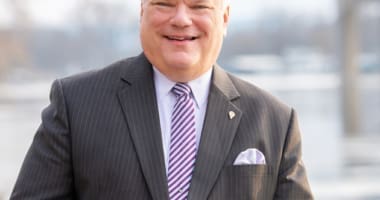If I asked what is the one most important activity that the College does each year, I would imagine that most of the membership would say the Annual Meeting. But from where I sit as the Executive Medical Director, I would answer the question by saying the yearly Leadership Summit. First, let me give you a brief overview of the recently completed sixth summit and then why it is so important to the College and our specialty.
Twenty young allergists, including our Junior FIT Representative to the Board of Regents, gave up a weekend away from family to journey to Chicago to participate in this year’s Leadership Summit. They came from all areas of the U.S. – some in academics, others in community practice, including large health care centers and small and solo practices. This diverse group, a majority (two-thirds) of whom were female, mirror the changes occurring in the demographics of allergists. The program on Saturday was introduced by our president, Mark Corbett, MD, FACAAI, and facilitated by Brenda Cross of Bold New Directions. This organization conducts management and leadership training to companies throughout the world such as Aetna, Cigna, Merck, AstraZeneca, GSK, BMW, IBM, Microsoft, and too many others to name here. Numerous areas of leadership were covered throughout the day with many participant activities intermixed to bring home key points. Topics included human fundamentals, overcoming barriers to communication, exploring the influence of positive communication, preventing and dissolving conflicts, empathy, and demonstrating courage in interactions.
Sunday’s activities centered on ACAAI, with presentations including College 101, the importance of committee work, by Mike Rupp, MD, FACAAI, chair of the Member Relations Committee and Payel Gupta, MD, FACAAI, chair of the Integrative Medicine Committee. Warner Carr, MD, FACAAI, chair of the Advocacy Council, explained the Council’s important role and shared insights on its work in advocating for allergists and their patients. The program ended with a terrific summary of what skills make an effective leader in allergy by Maureen Petersen, MD, FACAAI, a colonel in the Army, director of medical education at Walter Reed National Military Medical Center and a current member of the ACAAI Board of Regents.
Per the post-Summit evaluations, it was clear that the College met the goals of our attendees. “The Summit exceeded my expectations,” said Robert Sporter, MD, FACAAI. “The first day provided us real tools to improve leadership skills and interpersonal communication in my practice, in the ACAAI, and in my personal life. The group size was perfect – got to meet plenty of new friends in my peer group and it was a terrific opportunity to have direct interaction with high-level ACAAI leaders and mentors in a small group setting.” Another attendee, Minto Porter, MD, FACAAI, said, “This is the first time I’ve done behavioral assessments with allergists. It was nice to do it with others who can relate to our specific practice stresses. I appreciated meeting so many of the leaders within the College. We don’t have that opportunity at the Annual Meeting.”
So why is this annual leadership training important to the specialty of allergy? We need young leaders who can help guide the College over the next several decades. In the six years we have offered the Leadership Summit, many past participants have stepped into positions of leadership in the College – nearly a quarter are serving as committee chairs and vice chairs and four currently serve on the Board of Regents (another two rotated off the board in November). No doubt in the near future, we will have a College president who attended our Leadership Summit.
But it is much more than just a pipeline for leaders of the College. Medicine is changing rapidly. As more and more allergists enter academics and join large health care systems, we have less and less control of our practice. The “bean counters” leading these entities only worry about the bottom line. It is becoming an “us against them” culture and the “suits” are winning. By having allergists move up into leadership positions in these organizations, they can influence changes that emphasize the goal of caring for patients and not just the almighty dollar. We, as physicians, have lost control of health care in the U.S., but that doesn’t mean we can’t work on getting our voices heard. It starts with developing leaders in our ranks who can influence changes in their health care systems. That is why the College Leadership Summit, in my opinion, is the most important activity of this organization each year.
I have to give a big thanks to Katerina Barcal, ACAAI director of administration, and other College staff. Without Kate’s “Doer and Thinker” attitude, this event would not have been the success it was.


